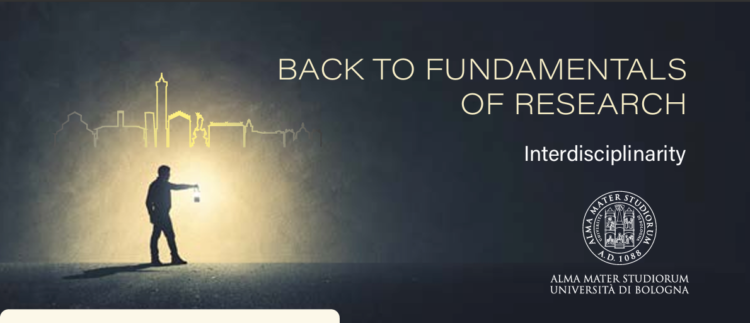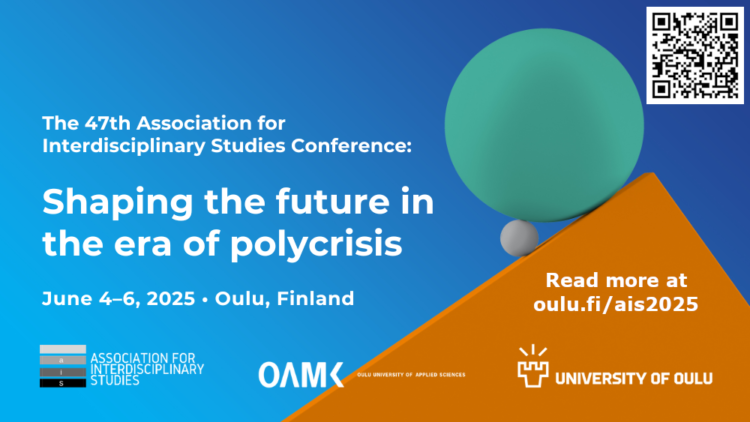SHAPE-ID member Prof Catherine Lyall was a keynote speaker at the University of Bologna's international…
SHAPE-ID Webinar 25th June | Pathways to interdisciplinary and transdisciplinary research for the Arts, Humanities and Social Sciences: Bridging the Research-Policy Gap
Shaping Conversations on Interdisciplinary Research
We are pleased to announce the second in our series of webinars on the integration of Arts, Humanities and Social Sciences in inter- and transdisciplinary research. Some of these events will stage broader conversations, with invited panellists from the SHAPE-ID community, consortium and Expert Panel. Others will focus on SHAPE-ID project results and on how to increase the uptake of recommendations from the project.
Format: Webinars will be hosted on Zoom and will take the form of short presentations from panellists followed by an interactive Q&A session with the audience. They will also be live-streamed on our Facebook page.
Pathways to interdisciplinary and transdisciplinary research for the Arts, Humanities and Social Sciences: Bridging the Research-Policy Gap
Thursday 25th June 13.00 – 14.15 CEST (12.00 – 13.15 GMT+1)
Register: click here to register
This webinar will take up one of the recommendations made in the recently published SHAPE-ID Policy Brief: that to increase the participation of the Arts, Humanities and Social Sciences (AHSS) in interdisciplinary research (IDR) and transdisciplinary research (TDR), policy makers and funders must work to involve AHSS researchers more substantially in programme design and evaluation. However, similar recommendations have been made many times already with limited impact. What are the challenges of implementing this recommendation and how can policy makers, researchers and Universities make progress on this front? Is this challenge specific to improving pathways to IDR and TDR or is it a more general problem with the interface AHSS researchers have built with policy makers?
Our panel comprising researchers, policy makers and science policy advisors will discuss these issues, followed by an interactive Q&A from the audience chaired by Professor Jane Ohlmeyer, Director of the Trinity Long Room Hub Arts and Humanities Research Institute, Chair of the Irish Research Council and Principal Investigator of SHAPE-ID.
Panellists
 What would research look like if we “walked the walk” of SSH integration?
What would research look like if we “walked the walk” of SSH integration?
Jennifer Edmond, Trinity College Dublin
What would research look like if we moved beyond expressions of support and actually “walked the walk” of SSH integration? In her talk Jennifer will discuss specific junctures where the gap between the rhetoric and practice of integration become apparent, proposing a number of practices that would simply be different if that gap didn’t exist, and considering how that can be achieved.
Dr Jennifer Edmond is Associate Professor of Digital Humanities at Trinity College Dublin where she is co-director of the Trinity Centre for Digital Humanities and a funded Investigator of the SFI ADAPT Centre. Outside of Trinity, Jennifer serves as President of the Board of Directors of the pan-European research infrastructure for the arts and humanities, DARIAH-EU, and is a member of the European Commission’s Open Science Policy Platform (OSPP). Over the course of the past 10 years, Jennifer has coordinated or participated in a large number of significant inter- and transdisciplinary funded research projects, worth a total of almost €9m, including CENDARI (FP7), Europeana Cloud (FP7), NeDiMAH (ESF), PARTHENOS (H2020), KPLEX (H2020), PROVIDE-DH (CHSIT-ERA/IRC) and the SPECTRESS network (FP7).
 Transformation of evaluation culture needed to enhance AHSS research integration
Transformation of evaluation culture needed to enhance AHSS research integration
Jack Spaapen, Royal Netherlands Academy of Arts and Sciences
The cliché that the world is changing rapidly has become a reality with the COVID-19 pandemic. Research agendas in many fields have taken a dramatic turn, medical and health research in the first place but also behavioural sciences, fields that study the economy, the organisation of work and communication. Emerging multi-level and cross disciplinary research collaborations need a different way of assessing what is worth investing in. Research evaluation needs to focus on looking ahead, mutual learning and new forms of creativity.
Dr Jack Spaapen (PhD, University of Amsterdam) received his training in sociology and cultural anthropology at the University of Amsterdam. Jack’s PhD (1995) is in science and technology studies, focusing on methods for the evaluation of research in the context of societal and policy demands. Jack is senior policy advisor at the Royal Netherlands Academy of Arts and Sciences with expertise in areas including societal impact evaluation, research and innovation policy, responsible research and innovation and scientific advice. Currently he is interim executive secretary of the Medical Advisory Council of the Academy. Jack has coordinated many Academy projects, as well as several EU projects, including the FP7 SIAMPI project on productive interactions between science and society (2009-2012) and Indicators for Responsible Research and Innovation (2014). Jack co-chaired a project for the OECD on the role of scientific advice in controversial issues in society (2013-2015). Jack has represented the Academy in several national and European networks on Research and Development evaluation. Jack co-designed the national evaluation protocol for publicly funded research (Standard Evaluation Protocol) and the QRiH assessment framework for societal relevance of humanities research in the Netherlands. Jack has proficiency in Dutch, English, French, German and Spanish.
 Bridging the AHSS Research-Policy Gap: A Policy Maker’s Perspective
Bridging the AHSS Research-Policy Gap: A Policy Maker’s Perspective
Mary Doyle, Trinity Long Room Hub
The Arts, Humanities and Social Sciences (AHSS) have important things to say about every aspect of human existence yet there remains a challenge in including them in a more meaningful way in research and innovation policy and funding programmes at both national and EU level. What steps can be taken to bridge the gap between AHSS research and policy making both in general and in the specific context of inter- and transdisciplinary research? Mary will address these challenges from the perspective of the policy maker – a key partner in this conversation – considering what can lead to a more seamless and stronger linkage and how to design the architecture of the conversations needed to strengthen this dialogue.
Mary Doyle is a Public Policy Fellow at the Trinity Long Room Hub. She retired from her role as Deputy Secretary General in the Department of Education and Skills in 2018. She joined the Department in 2012 where she had responsibility for Higher Education Policy, Funding and Legislation later taking responsibility for Further Education also. Mary worked for many years in the Department of the Taoiseach, acting in a variety of roles including corporate affairs, arts and culture and economic and social policy roles. She acted as Secretary to a range of Cabinet SubCommittees including Infrastructure, Social Inclusion, Health and the Economy and chaired the Senior Officials Groups which supported these SubCommittees. She also worked in the Departments of Health and Department of Children during the course of her career. She is currently a Board member of Science Foundation Ireland and of The Wheel.



